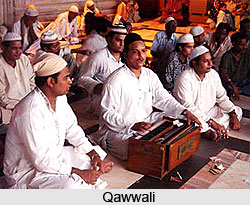 Qawwali is a form of Sufi devotional music popular in South Asia, particularly in Muslim presence, such as southern Pakistan, and parts of North India. The style is rare, though not entirely absent, in North India and West Pakistan, Bangladesh, and Kashmir.
Qawwali is a form of Sufi devotional music popular in South Asia, particularly in Muslim presence, such as southern Pakistan, and parts of North India. The style is rare, though not entirely absent, in North India and West Pakistan, Bangladesh, and Kashmir.
Types of Qawwali songs are categorised according to the timings of their singing and lyrics of the song. Traditionally, a qawwali performance starts with a hamd. A Naat is the Arabic term for description and is a song in praise of the Prophet Muhammad. The opening hamd is traditionally followed by a naat. A manqabat is a song in praise of either Imam Ali or one of the Sufi saints. Interestingly, manqabats in praise of Ali are sung at both Sunni and Shi`a gatherings. If one is sung, it will follow right after the naat. There is usually at least one manqabat in a traditional programme. A marsiya or lamentation for a dead person is sung over the death of much of Imam Husayn`s family in the Battle of Karbala. Once again, this would typically be sung only at a Shia concert.
A ghazal or love song is a song that sounds secular on the face of it. There are two extended metaphors that run through ghazals -- the joys of drinking and the agony of separation from the beloved. These songs feature exquisite poetry and can certainly be taken at face value and enjoyed at that level. In fact, in Pakistan and India, ghazal is also a separate, distinct musical genre in which many of the same songs are performed in a different musical style, and in a secular context. In the context of that genre, the songs are usually taken at face value, and no deeper meaning is necessarily implied. But in the context of qawwali, Qawwali songs of intoxication and yearning use secular metaphors to poignantly express the souls longing for union with the Divine, and its joy in loving the Divine.
In the songs of intoxication, "wine" represents "knowledge of the Divine", the "cupbearer" (saaqi) is God or a spiritual guide, the "tavern" is the metaphorical place where the soul may (or may not) be fortunate enough to attain spiritual enlightenment. (The "tavern" is emphatically not a conventional house of worship. Rather, it is taken to be the spiritual context within which the soul exists.) Intoxication is attaining spiritual knowledge, or being filled with the joy of loving the Divine. In the songs of yearning, the soul, having been abandoned in this world by that cruel and cavalier lover, God, sings of the agony of separation, and the depth of its yearning for reunion. A kafi is a poem in Punjabi, Seraiki or Sindhi, which is in the unique style of poets such as Shah Hussain, Bulle zh Shah and Sachal Sarmast. Two of the better - known Kafis include Ni Main Jana Jogi De Naal and Mera Piya Ghar Aaya. A munadjaat or conversation in the night is a song where the singer displays his thanks to Allah through a variety of linguistic techniques. It is often sung in Persian, with Mawlana Jal?l-ad-D?n Rumi credited as its inventor.
A group of qawwali musicians, called a party, typically consists of eight or nine men. The women were usually excluded from traditional Muslim music as respectable women are traditionally prohibited from singing in the presence of men, though these traditions are changing and women also participate in different types of Qawwalis. A lead singer, one or two side singers, one or two harmoniums, which may be played by the lead singer, side singer or someone else and percussion makes the complete group for Qawwali. If there is only one percussionist, he plays the tabla and dholak, usually the tabla with the dominant hand and the dholak with the other one, i.e. a left-handed percussionist would play the table with his left hand. Often there will be two percussionists, in which one might play the tabla and the other the dholak. There is also a chorus of four or five men who keep on repeating key verses, and who aid and support percussion by hand clapping.
The performers of Qawwali sit cross-legged on the ground in two rows and the lead singer, side singers and harmonium players in the front row, and the chorus and percussionists in the back row. Before the fairly recent introduction of the harmonium, qawwalis were usually accompanied by the sarangi. The sarangi had to be played in between songs; the harmonium was soon preferred in Qawwalis.




















